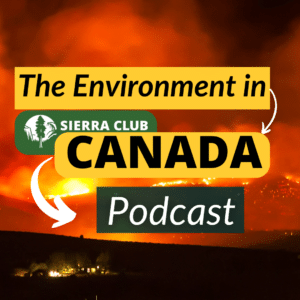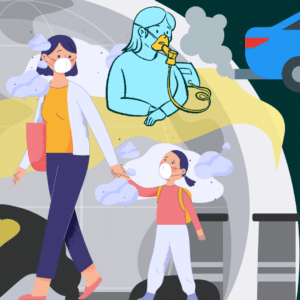The Carbon Tax Lie
The Environment in Canada Podcast Episode 10 on the Carbon Tax Lie, Listen Below on YouTube.
The carbon tax debate completely leaves out the carbon price’s impact on immediate fossil fuel-produced air pollution which contributes to the premature deaths of of 1 out of 7 Canadians (more facts on the sources of air pollution, fossil fuels being the lead cause, are available here and here).

Subscribe for more updates on this topic and environmental issues like it.
Whatever your take on carbon pricing happens to be (for or against) there’s one thing that’s for certain: Climate change costs us more. Climate change costs us the health of those we love as they breath in wildfire smoke and it costs Canadians their homes by flooding and fires.
The fossil fuel industry wants people to believe it’s climate policy that costs Canadians, that climate policy is part of some big conspiracy, when its the industry’s actions and obscene profits which really make the difference. That’s biggest carbon tax lie out there – especially since for each dollar of inflation in the last two years in Canada, 25 cents has gone to oil and gas and mining extraction profits.
We talk about the real costs of carbon pricing and how it’s centrality in conversations about the cost of living and climate policy is a distraction from more pressing concerns – a distraction that the oil and gas lobbyists love. We also discus the carbon price’s minimal impact on inflation (even with knock on effects), the minimal impact of upcoming carbon price increases, the methodology of the Parliamentary Budget Officer, and how to talk with others on this issue.
More Details: The Carbon Tax Impact in Canada
What is the real impact of the carbon tax in Canada? The carbon tax only contributes a fraction of a percent towards inflation, even with knock-on effects, whether you’re in Alberta or Ontario, or Nova Scotia. Meanwhile 25 cents of every dollar of inflation over the past two years in Canada has gone to oil and gas and mining industry profits. What the carbon tax does do is help bring down air pollution from burning fossil fuels which has a serious benefit to people’s health in Canada.
Carbon Tax Impact on The Economy and Canadian Households
Over 200 Canadian economists back carbon pricing as having minimal economic impact, being a benefit to the climate, being the cheapest way to deal with climate change, and have confirmed that most families get more back.
Numbers you may be hearing quoted from the Parliamentary Budget Officer’s report confirm that the impact on inflation is a fraction of a percent. References to numbers on the “costs to the economy” are being used out of context and don’t account for costs of climate change (billions) or the benefits of a green economy.
Using the PBO’s carbon tax numbers this way would be like an early 20th century person calculating the costs of moving away from an economy based on horse-drawn carriages without including the benefits of having access to motorized transport. We deal with this more in the podcast below. And again no, the run on effects of the carbon prices do not add significantly more to inflation.
Climate change is already costing Canadian households billions of dollars, and people in flood prone areas will have trouble getting mortgages for their homes.
Health, Air Pollution, Fine Particles, and Carbon Pricing
 One in 7 deaths of Canadians are due in part to fossil fuel particles, and carbon pricing helps prevent these deaths by diminishing the amount of fossil fuels burned.
One in 7 deaths of Canadians are due in part to fossil fuel particles, and carbon pricing helps prevent these deaths by diminishing the amount of fossil fuels burned.
By 2018, “for every household in the BC metropolitan areas – after the carbon tax (was introduced) – we have a five per cent to 11 per cent reduction in local air pollution,” said Lorenzo Sileci, the author of the study and a post-doctoral researcher at the London School of Economics. – Global News.
And yes, fossil fuels are the cause of this pollution.
Climate Change, Renewable Energy, and CO2 Myths – does the Carbon Tax Work?
Yes, carbon pricing is a highly effective way to reduce emissions in Canada. How the tax works is covered in this podcast, also available below.
The carbon tax still works if you get more back by rebate. Here’s how:
- If you don’t switch away from fossil fuel use or use less, you still get back the rebate, which for most families is more than the cost.
- The tax is just a price signal and the rebate is there to make sure you’re not worse off financially. But you can gain even more financially by listening to the price signal and then using the money from the rebate to invest in things that lower energy use or are greener alternatives. Think of the carbon tax as a way to put a price on pollution and give the money in rebates back to low income Canadian households so they can go green since they will have the hardest time doing so
A renewable energy transition is completely possible and people won’t freeze because of it. We deal with this in a different podcast episode.
Yes, CO2 is a pollutant in the case of climate change and human caused CO2 causes climate change – it’s not just plant food.
No, volcanoes are not to blame for more emissions that humans. Humans emit 100 times more CO2 than volcanoes.
When it comes to Canada’s wildfires last year it is NOT arson that’s to blame and the climate crisis made the spate of Canada wildfires twice as likely, read more in untangling climate misinformation around Canada’s raging wildfire.
Finally, Canada’s forests haven’t absorbed more carbon than they’ve released since 2001. Further, blaming other countries for climate change overlooks both Canada’s high per capita emissions and historical emissions that contributed to the climate crisis. We won’t inspire others to do more on climate change if we continue to contribute a lot more emissions per person than they do.
You can find more on other common climate myths at this website. And you can read more about our work on climate change on our program page.
Don’t forget to take action!
Podcast Guests
Dr. Louise Comeau is a Senior Advisor at Re.Climate, Carleton University’s centre for climate change communications and public engagement. She is also a member of the federal Net Zero Advisory Body. Louise has more than 30 years’ experience in climate change policy, communications, and solutions-related advocacy and programming. Louise holds a doctorate in environmental management, focused on environmental ethics and behaviour change from the University of New Brunswick.
Robb Barnes is the Climate Program Director at the Canadian Association of Physicians for the Environment (CAPE). Robb has over 20 years of nonprofit governance experience, including 15 years of involvement on climate and environmental issues. Robb’s work has focused on executive leadership, engagement organizing, climate-friendly cities and data-driven communications.
